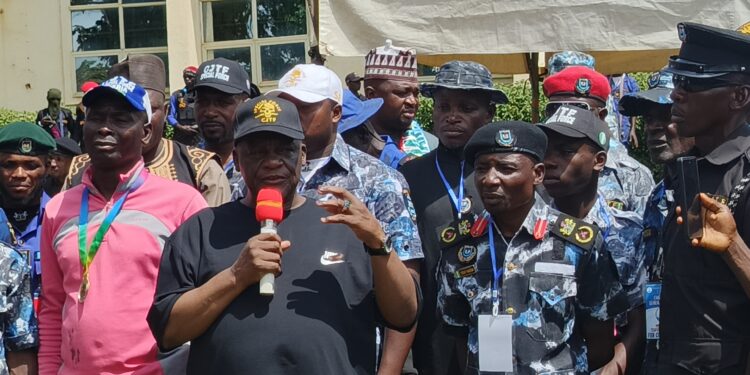By Abubakar Yunusa
The Federal Capital Territory (FCT) Police Command has expressed readiness to collaborate with the Civilian Joint Task Force (CJTF) to address the growing insecurity in the nation’s capital, Abuja.
This was disclosed by the Commissioner of Police, Olatunji Disu, during an emergency meeting and the unveiling of the CJTF operation office in Abuja, yesterday.
The Commissioner, represented by Mr. Usman A. Abini, the APO District Police Officer, praised the efforts of the CJTF in filling the gaps left by manpower shortages within the police force.
“The challenges that we’ve always had in terms of manpower and visibility are always bridged by the presence of the CJTF,” Abini said.
He further emphasized the commitment of the police to work closely with the CJTF.
“We are always ready to synergize with you and work with you in the operational field, administration, and any other area that will improve the lives of our citizens,” he added.
The CJTF’s collaboration with the police has been most visible in joint operations in various parts of the FCT, particularly at night, in areas such as the APO division.
According to the Commissioner, these partnerships have been instrumental in boosting security and curbing criminal activities.
“The CJTF is very close to the members of the public, which has been invaluable in our operations,” Abini noted, highlighting the role of the task force in gathering intelligence and engaging with communities.
Speaking at the event, the National Chairman of the Civilian Joint Task Force of Nigeria (CJTFN), Prof. Muhammed Kailami, emphasized the importance of national unity and security.
“Nigeria’s unity is a task that must be done, and that is what we are after,” he said. Kailami described the CJTF’s work as a sacrifice, noting that members are unpaid volunteers working with both the police and the army to ensure safety.
Kailami expressed hope that the government would formalize the CJTF’s role in the future by providing salaries and equipment.
“One day, we hope the government will fully establish the CJTF, where you have salaries and the necessary equipment to work, so that Nigerians can sleep with their two eyes closed,” he said.
He also touched on the broader impact of insecurity on the nation’s food production, stating that farmers are unable to cultivate their land due to threats from bandits.
“Apart from the fuel subsidy or the dollarization, the hardship on Nigerians has no measure,” Kailami lamented, attributing part of the crisis to the activities of criminals who disrupt agricultural activities.
Kailami urged CJTF members to continue their work with honesty, sincerity, and discipline.
He also called for improved communication and record-keeping among the state chapters of the CJTF, stating that each state must submit reports to the national commission for transparency and coordination.
“We are going to work on the new office to give it a facelift,” Kailami said, noting that the CJTF is committed to strengthening its infrastructure as it continues its operations across the country.











